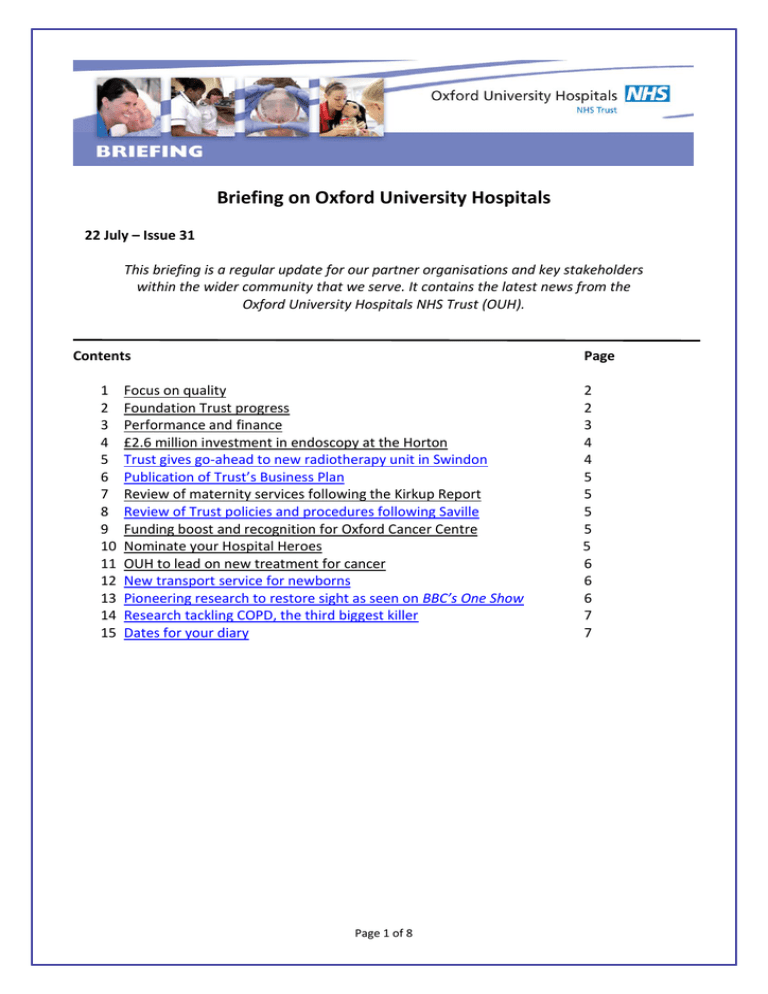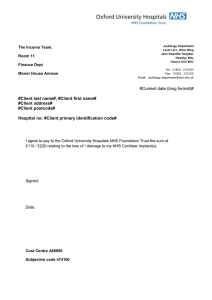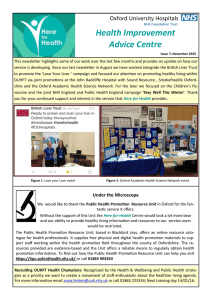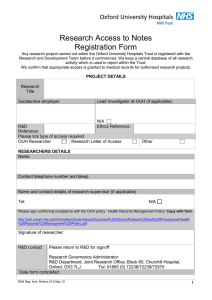Briefing on Oxford University Hospitals
advertisement

Briefing on Oxford University Hospitals 22 July – Issue 31 This briefing is a regular update for our partner organisations and key stakeholders within the wider community that we serve. It contains the latest news from the Oxford University Hospitals NHS Trust (OUH). Contents 1 2 3 4 5 6 7 8 9 10 11 12 13 14 15 Page Focus on quality Foundation Trust progress Performance and finance £2.6 million investment in endoscopy at the Horton Trust gives go-ahead to new radiotherapy unit in Swindon Publication of Trust’s Business Plan Review of maternity services following the Kirkup Report Review of Trust policies and procedures following Saville Funding boost and recognition for Oxford Cancer Centre Nominate your Hospital Heroes OUH to lead on new treatment for cancer New transport service for newborns Pioneering research to restore sight as seen on BBC’s One Show Research tackling COPD, the third biggest killer Dates for your diary Page 1 of 8 2 2 3 4 4 5 5 5 5 5 6 6 6 7 7 1 Focus on quality The Trust has published its annual Quality Account outlining its key achievements for the year, where improvements need to be made and priorities for the coming year. The Trust had a successful meeting with patients, members of the public and interested parties to discuss its priorities in June and this will be followed up with a further meeting in October, date to be confirmed. The Trust’s Quality Priorities for 2015/16 Domain PATIENT SAFETY Quality Priorities for the Trust 1. Preventing avoidable patient deterioration and harm in hospital: Sign up for Safety 2. Partnership working to improve urgent and emergency care 3. Improving recognition, prevention and management of acute kidney injury CLINICAL EFFECTIVENESS 4. Learning from deaths and harms to improve patient care PATIENT EXPERIENCE 6. End of life: improving people’s care in the last few days and hours of life 5. Management of patients presenting with sepsis 7. Improving communication, feedback, engagement and complaints management: with patients, carers, healthcare staff and social care providers The full account can be found here: Quality Account 2014-2015 2 Foundation Trust progress Members of OUH’s Board met members of Monitor’s Board in mid-July as part of the final stage of the regulator’s assessment of the Trust’s readiness to operate as a Foundation Trust (FT). As anticipated, the Trust has had a series of additional questions from Monitor, which seek to clarify issues that arose at the Board to Board meeting. The Trust will be responding to these over the next couple of weeks. We are hoping that a decision can be made in the near future and we are continuing to take the final steps that will enable us to become an FT as soon as a decision is made by Monitor. Meanwhile, the Council of Governors is getting ready to operate once authorisation takes place. Page 2 of 8 3 Performance and finance The figures below relate to the Trust’s performance at the end of month two, May 2015, as reported to the Trust Board in July 2015. You can read the full report here: Integrated performance report – month two Operational performance Delayed transfers of care This area remains of significant concern to the Trust. In May, delayed transfers of care (as a percentage of occupied beds) was up at 11.14%. We aim to achieve 3.5%. We continue to work hard with partners in social services and Oxford Health to improve discharge rates. Access targets Four Hour Standard The Trust has met its target of admitting or discharging 95% of its patients within four hours of arrival. 96.38% of patients were seen within four hours in May and 96.2% in June. Cancer waits Seven of the eight national cancer waiting time standards were achieved in May. However, the standard for cancer patients to start treatment within 62 days of referral was not achieved. The Trust does not want any patient to be waiting longer than necessary, and continues to work on an action plan which includes quicker diagnosis to offer earlier treatment and speeding up the time of referral from other hospitals as well as encouraging better communication to ensure patients are aware of the reason for an urgent referral, and therefore the requirement to take up appointments offered. Stroke patients In May we met our national target of 80% of patients with stroke spending more than 90% of their time on the Stroke Unit. 86.9% of our patients spent more than 90% of their time there. Diagnostic tests Patients waiting for a diagnostic test should wait no more than six weeks from referral. We continue to meet the target of no more than 1% of patients waiting longer than six weeks. 18 week wait standards We have met the nationally set standards for non-admitted patients (outpatients) and for patients on an incomplete pathway (those who have yet to start treatment) to begin treatment within 18 weeks of referral. However, May’s figures for admitted patients were 87.81% (against a national standard of 90%). Infection control There have been no avoidable cases of MRSA throughout the Trust so far this year meaning that at the moment we are meeting our target (of no avoidable cases for the year). We have had seven cases of Clostridium difficile against an upper limit of 69 avoidable cases. Page 3 of 8 Finance The Trust has reported that it was £0.5m behind its planned financial position to break even after the first two months at the end of May. The financial challenges for the Trust for 2015/16 are to: deliver the contracted levels of activity reduce the cost of premium staff (reduce reliance on agency staff through improving recruitment and retention) deliver the savings and transformation programme. For more on the Trust’s latest finances see: Trust Board paper – Financial performance up to 31 May 4 £2.6 million investment in endoscopy at the Horton General Hospital The Trust Board agreed to a £2.6 million investment to bring the unit at the Horton up to the latest standards. This investment will secure the future of endoscopy services at the Horton and also prevent people travelling unnecessarily in the future. The improvements allow for the better provision of same-sex accommodation and improved decontamination. During the build period, the Trust had hoped to provide replacement facilities on site at the Horton. Unfortunately, this has not proven to be financially or practically possible because of the kind of provision needed. It is estimated that about a quarter of patients live equidistant between the John Radcliffe Hospital and the Horton, but for the remaining patients we recognise that this will mean an inconvenience, and so we are looking at ways to offer various patient transport options in order to help. Inpatients at the Horton will be able to continue to have endoscopies in theatre. The work is expected to take approximately 16 weeks, starting in the autumn. The full business case can be found here: Full business case for redevelopment of the Horton Endoscopy Unit 5 Trust gives go-ahead to new radiotherapy unit in Swindon At its meeting on 8 July the Trust Board agreed to support a satellite radiotherapy unit to be based at the Great Western Hospital in Swindon. The radiotherapy service will be a satellite of the OUH Cancer Centre based on the Great Western Hospital site, and will be greatly appreciated by the 700 patients a year from Swindon and Wiltshire who currently travel on a daily basis to the Churchill Hospital for radiotherapy. The launch of the fundraising appeal in Swindon in May 2015 The proposal is still subject to the approval of the Trust Development Authority and NHS England in respect of the funding needed to support the development over the next ten years. For more see: OUH gives go-ahead to satellite radiotherapy unit in Swindon Page 4 of 8 6 Publication of Trust’s Business Plan The Trust’s Business Plan for 2015/16 has been approved by the Trust Board and submitted to the Trust Development Authority. It can be viewed on the Trust’s website at Trust Business Plan 2015/16. The corporate objectives are set out in Appendix B. 7 Review of maternity services following Kirkup Report The Kirkup Report was written following an independent investigation into the management, delivery and outcomes of care provided by the maternity and neonatal services at the University Hospitals of Morecambe Bay NHS Foundation Trust from 2004 to 2013. There were some serious failings identified as part of the review. The Trust has reviewed its own maternity services in the light of the Kirkup Report and its recommendations. Our maternity services generally comply with the majority of the recommendations of the Kirkup Report. An action plan has been developed for those areas where there is still more work to be done. For more information on this, please see the paper to the Trust Board in July: Kirkup Report 2015 gap analysis maternity services 8 Review of Trust policies and procedures following Savile In March 2015, the Chief Executive of the Trust Development Authority (TDA) wrote to all NHS trust chief executives to highlight the publication of the Lessons Learnt Report (post Savile). The Trust has, in line with these recommendations, reviewed the report against our own practices, procedures and policies, developed an action plan where we need to improve anything and ensured that actions are taken in a timely manner. For more on this read the Trust Board report: NHS Savile investigations – lessons learnt recommendations 9 Funding boost and recognition for Oxford Cancer Centre at the Churchill Hospital The Oxford Cancer Research UK Centre based at the Churchill Hospital is one of the first in the country to be given Major Centre status, which brings £5m extra funding over two years. The Centre is a partnership between the Trust, the University of Oxford and Cancer Research UK. Only two other centres in the country, Cambridge and Manchester, have been given Major Centre status. For more on this please see: Funding boost for Oxford Cancer Centre 10 Nominate your Hospital Heroes! Members of the public are being asked to nominate staff who they feel have gone above and beyond the call of duty from across the John Radcliffe Hospital, Churchill Hospital, Nuffield Orthopaedic Centre and Horton General Hospital. The Oxford Mail has asked people to put Page 5 of 8 forward an individual or team, who have given exceptional service and compassionate care, for an award. Watch out for the nominations, some of which will be featured in the Oxford Mail. Oxford Mail launches search for Hospital Heroes 11 OUH to lead on new treatment for cancer Oxford University Hospitals NHS Trust is one of the first in the country to offer patients treatment with stereotactic ablative radiotherapy (SABR). This innovative type of radiotherapy delivers a more precise technique which allows high doses of radiation to be administered to patients whilst causing less damage to surrounding healthy tissue. The Trust currently delivers radiotherapy to 3,600 patients a year. Staff at the Churchill Hospital will be using SABR to treat oligometastatic disease (cancer that has spread to another part of the body), primary liver tumours and the re-irradiation of cancers in the pelvis and spine. For more on this story please visit our website: Hundreds more patients to benefit from new treatment for cancer 12 New transport service for newborns From 1 July OUH and University Hospital Southampton NHS Foundation Trust will provide specialist newborn transport services across the Thames Valley and Wessex regions. The contract was awarded to the Oxford and Southampton Children’s Hospital Network (CHN). The service provides emergency intensive care transport for newborn babies to the newborn intensive care units at the John Radcliffe Hospital in Oxford, as well as repatriation of babies back to their local hospitals once intensive care treatment is no longer required. Page 6 of 8 13 Pioneering research to restore sight as seen on BBC’s One Show Research taking place at the West Wing at the John Radcliffe Hospital featured on the BBC’s One Show in July. A film crew recorded patient Richard Chandler’s journey with John Radcliffe researchers who are trialling a new form of gene therapy to tackle choroideremia. Mr Chandler, of Reading, was slowly losing his eyesight and is one of 48 people from around the world to get the therapy that researchers hope can stop or even reverse the condition. Sufferers are missing a key gene in their retina. The technique involves injecting a virus to deliver billions of healthy genes to replace the missing gene. A film crew followed his journey from his home to the JR’s operating theatres. To watch it on iPlayer see: www.bbc.co.uk/iplayer/episode/b06157d0/the-one-show08072015 14 Research tackling COPD, the third biggest killer Researchers at OUH are investigating a potential new way to treat one of the world’s most common lung diseases after a study found a link between sufferers’ iron levels and worse health outcomes. Researchers are to give iron to people with chronic obstructive pulmonary disease (COPD) – commonly caused by smoking – to see if it can improve the debilitating condition. To find out more see New hope to tackle third biggest killer disease Professor Peter Robbins of the University of Oxford who led the research 15 Dates for your diary Public events The Fox Got You Until Monday 31 August University of Oxford Botanic Garden, Rose Lane OX1 Photographic exhibition celebrating six medicinal plants, with contributions from OUH clinicians and patients. For more information please see the University of Oxford Botanic Garden website: www.botanic-garden.ox.ac.uk/fox-got-you Trust Annual General Meeting Thursday 17 September 2015 – Refreshments from 5.30pm for a 6.00pm start Tingewick Hall, Level 1, Academic Centre, John Radcliffe Hospital, Headley Way, Oxford OX3 9DU Page 7 of 8 The Trust’s Annual General Meeting is open to the public and is an opportunity to come and meet the Trust’s Board of Directors as well as members of its Council of Governors, to hear a review of the previous year and to give feedback on future services. We will also have a talk on developments in the Trust’s cancer services from Dr Claire Blesing, Clinical Director for Oncology and Haematology. Oxford Biomedical Research Centre Public Talks Antibiotic resistance Thursday 17 September 2015 – Refreshments from 6.00pm for a 6.30pm start Lecture Theatre, Level 1, Nuffield Orthopaedic Centre Professor Angela Brueggemann, Associate Professor at the University of Oxford’s Nuffield Department of Medicine, will discuss the issues around the increasing prevalence of antimicrobialresistant bacteria in hospitals and the community. Dementia Information Café at the John Radcliffe Hospital Once a month on the last Tuesday 2.00pm - 3.30pm Onthree (restaurant), Level 3, John Radcliffe Hospital Are you visiting a friend or relative with dementia in hospital, or caring for someone with the condition? Why not join us for tea, biscuits and an informal chat about the support available? Help and advice will be on hand from the Alzheimer’s Society, Carers Oxfordshire, Oxfordshire Age UK and Guideposts Oxfordshire. For more information about the Dementia Information Café please contact gaynor.parsons@ouh.nhs.uk Charitable events Abseil for your hospital charity Sunday 20 September 2015 For more information please call 01865 743444, email charity@ouh.nhs.uk or go to www.ouh.nhs.uk/charity This briefing was prepared by: Susan Brown Senior Communications Manager Head of Stakeholder Engagement and Foundation Trust Membership Oxford University Hospitals Tel: 01865 231475 Email: susan.brown@ouh.nhs.uk 23 July 2015 Page 8 of 8


